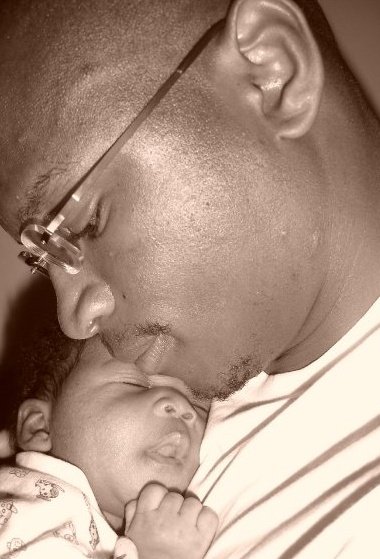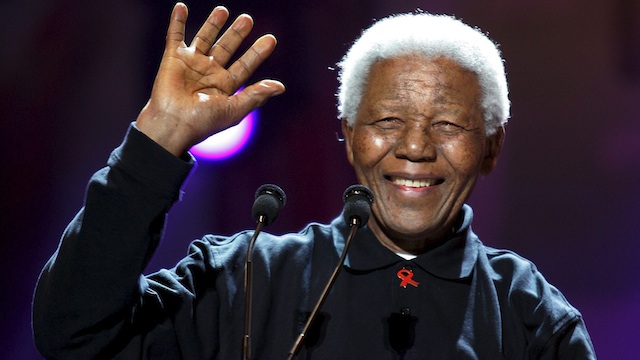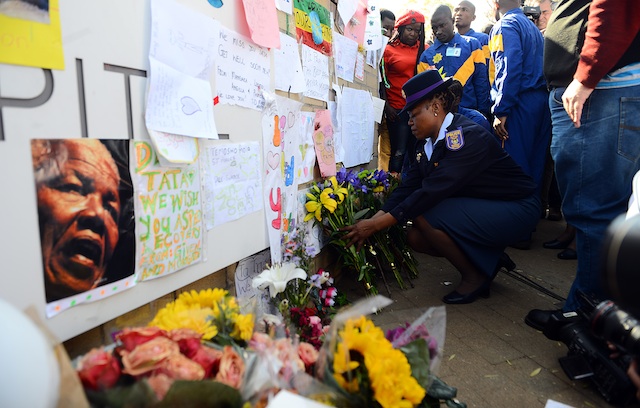SUMMARY
This is AI generated summarization, which may have errors. For context, always refer to the full article.
 South Africans, Africans and the World at large cringe with fearful and inevitable thoughts of losing South Africa’s most respected and cherished man, Nelson Rholihlahla Mandela.
South Africans, Africans and the World at large cringe with fearful and inevitable thoughts of losing South Africa’s most respected and cherished man, Nelson Rholihlahla Mandela.
The 94 year old statesman has been hospitalised several times since last December and all seems to be due to the serious condition of a lung infection. Messages of well wishes have been coming in from all corners of the globe, with people standing outside the hospital where Mandela is being treated carrying heartfelt messages of “Get well soon”. Even school children have been seen visiting his house, singing songs of hope and well wishes.
As a nation, South Africa has its own challenges, including how to arrest the increasing gap between the ‘haves’ and the ‘have not’, how to approach and address the injustices of the past, but one thing is for sure, when it comes to our beloved Mandela, we are one and unity reigns supreme.
Father of the nation
Born in 1918, July 18th, Mandela dedicated his whole life to the struggle against apartheid. To most of us Mandela means so many different things and names. He is well known as “The father of the nation”, or “Tata” meaning father in Xhosa, but the one I like most is his Xhosa clan name, “Madiba”.
The greatness of Madiba comes from many places and what stands out in his story is that, for someone to struggle the way he did, with his freedom being taken away by the apartheid government and sending him to prison for 27 years for his belief in equality, freedom and justice for all and yet, when he was released from prison he said, “As I walked out the door toward the gate that would lead to my freedom, I knew if I didn’t leave my bitterness and hatred behind, I’d still be in prison.”
When Madiba was inaugurated in 1994 as the first democratically elected black president of South Africa, he uttered these words which again reflect the lack of bitterness over his harsh treatment, he said “Never, never and never again shall it be that this beautiful land will again experience the oppression of one by another.”

Education is power
So, what does Madiba mean to me? A sentiment I am certain is echoed within each and every person is that the lives of struggle icons like Mahatma Ghandi, Martin Luther King, Steve Biko, Oliver Tambo or Mandela himself are motivating because they often tell a story of humble beginnings ultimately leading to immeasurable greatness. A story of struggle, pain and a life full of compromise and yet never losing focus on the bigger picture, one bigger than self.
Mandela once said, “Education is the most powerful weapon which you can use to change the world.” To people like myself, coming from humble beginnings, with no money to afford quality education and where few gave us a chance, Madiba’s words gave us the reason to desire to be educated, to be more than a product of our circumstances, because he made us believe that education is our only ticket to making a significant difference in the society. If Mandela and other struggle comrades made it, mind and vision intact under a harsh political environment where there was neither place nor reason for a black man to be educated and yet they came out victorious, then we too must do better to honour our struggle stalwarts.
The irony of our history is that, without the endured hardships, what we today know as freedom couldn’t have existed. The effect on us, the benefactors of the conquered hardship that was apartheid, has taught us the value in which we attach in the wonder which is our country, our beautiful and beaming with opportunity country-regardless of race, colour or creed.

Right and just
What we have gained from Madiba’s struggle and presence in our lives has influenced how we in turn have interpreted and implemented his teachings of fighting for what is right and just, doing what is necessary for all, harbouring no ill-feelings towards those who advocated for our oppression.
From everything that we conduct, its value in our own personal hierarchy, the extent to which we persevere, give back and respect each other in the mist of our humble beginnings, have aided the determination of how we have continued to venture forward in creating and cementing current and future freedom for all.
From the roles we are able to take up in society today and whether we become productive citizens, good and upstanding ones or even just appreciative like-minded citizens.
Struggle for freedom
At the height of his political trial in 1964, Madiba, speaking from the dock closed his speech with these words “I have cherished the ideal of a democratic and free society in which all persons live together in harmony and with equal opportunities. It is an ideal which I hope to live for and to achieve. But if needs be, it is an ideal for which I am prepared to die.” For me this epitomises Madiba’s belief in selflessness.
At the time when he could have used to defend himself and perhaps plead mitigation for his charges, he stood firm on his believes and true to the struggling for freedom which I have and enjoy today. It is for this reason I truly believe that as South Africans this is the time when we must celebrate a life well lived.
Let us cherish his greatness with our thoughts, hearts and most importantly with our actions. His thoughts and spirit will forever be with us. The world is yet to see another great man like Madiba, neither in this generation nor for generations to come. “Madiba”, a name that shall forever resonate in everything South Africa, African, the World at large and remain our beloved world peace icon for many centuries to come.
Thank you Madiba for the life I have today! – Rappler.com
On April 5, 1962, South African police arrested and jailed Nelson Mandela along with Cecile Williams. He was charged with inciting workers and leaving the country without permission. He was released on 11 February 1990 after 27 years in prison.
Moshisi Lehlongwane grew up in South Africa and took up his Masters in Public Policy from the Lee Kuan Yew School at the National University of Singapore.
Add a comment
How does this make you feel?
There are no comments yet. Add your comment to start the conversation.